38 reading food labels diabetes
Decoding Diabetes: How to Read Nutrition Labels | Accu-Chek The calories in the foods you eat are made up of fat, protein, and carbohydrates. Nutrition labels are typically made based on the assumption that you have a daily diet of 2,000 calories (kilocalories). Some labels will have a footnote that expand on this concept, providing numbers for both 2,000 and 2,500-calorie (kilocalorie) diets. Nutrients. PDF Label reading basics for diabetes - Veterans Affairs Label Reading Basics for Diabetes Nutrition and Food Services (05/2020) Serving Size • The serving size is the portion size used for all the values on the label. • Different foods have different serving sizes. • The serving size on this label is 2/3 cup. Servings per Container • Indicates the number of
Making Sense of Food Labels | ADA - American Diabetes Association Reading labels can help you find these hidden sources and compare the sodium in different foods. Whether you have diabetes or not, 2300 milligrams (mg) or less per day is the general recommendation. If you have high blood pressure, talk with your health care team to find out the best goal for you. List of ingredients

Reading food labels diabetes
Reading labels | Diabetes UK Key points Always look at the 'total carbohydrate' on the label when carb counting. This will make sure you are counting both the complex (starchy) and simple (sugary) carbs in your food. Both will raise your blood glucose (blood sugar) levels, and need to be matched with insulin. Understanding food labels | Diabetes UK Check the ingredients list - if syrup, invert syrup, cane sugar, molasses or anything ending in 'ose' is within the first three ingredients, this suggests the food contains more added sugar. Choose an alternative if possible, or be mindful of the portion you eat. Check the fibre content on the back of pack label. Reading food labels: Tips if you have diabetes - Mayo Clinic Food labels can be an essential tool for diabetes meal planning. Here's what to look for when comparing food labels. By Mayo Clinic Staff When you live with diabetes, your diet is a vital part of your treatment plan. Of course, you know what you're eating — a turkey sandwich, a glass of skim milk, a sugar-free fudge pop.
Reading food labels diabetes. Reading Food Labels When You Have Diabetes - WebMD Talk to your doctor or your diabetes educator about how to adjust the % Daily Values on labels for your diet. In general, when it comes to fat, saturated fat , cholesterol, and sodium, choose foods... How to Read the New Food Label All food products should have the new label by January 2021. It's essential for people with diabetes to read labels and understand what's in the food you eat. The Nutrition Facts label gives you information to compare products and decide what's right for you. When reading the Nutrition Facts label, start at the top with information about servings. Reading Food Labels When You Have Diabetes | HealthLink BC Start with the "% Daily Value" column on the food label. A food is considered low in a specific nutrient (such as fat, saturated fat, cholesterol, carbohydrate, or sodium) if it has 5% or less of the daily value. A food is considered high in that nutrient if it has 15% or more of the daily value. Watch out for health claims on food labels. Reading Food Labels When You Have Diabetes | Kaiser Permanente Start with the "% Daily Value" column on the food label. A food is considered low in a specific nutrient (such as fat, saturated fat, carbohydrate, or sodium) if it has 5% or less of the daily value. A food is considered high in that nutrient if it has 20% or more of the daily value. Watch out for health claims on food labels.
Reading food labels: Tips if you have diabetes - Augusta Health Reading food labels: Tips if you have diabetes. Content provided by Mayo Clinic. Date Updated: 06/25/2021. Start with the list of ingredients. Consider carbs in context. Put sugar-free products in their place. Beware of fat-free products. Know what counts as a free food. Do the math. PDF TO CARE 4 YOURSELF READING A NUTRITION FACTS LABEL - novoMEDLINK Reading the label can help you compare the amount of sodium in different foods so that you can choose lower-sodium options. Talk with your diabetes care team about what to include in your meal plan. Reading a Nutrition Facts label Reference: 1. American Diabetes Association. Standards of medical care in diabetes—2019. How to Read Food Labels When You Have Type 2 Diabetes Quick Tip: When you see sugar-free on a label it means less than 0.5 grams of sugar per serving. No sugar added doesn't mean low or no-carb. A lot of food labels say "no sugar added" but these foods might have tons of carbs. No sugar added simply means no sugar was added during processing or packaging. Sugar alcohols have hidden carbs. PDF What Can I eat? - American Diabetes Association list of everything that is in the food. They are listed by the highest amount to the least. If the first word in the list is sugar, then there is more sugar in the food than anything else. Reading Food Labels Food labels can help you choose what foods to eat. Use the labels at right to find the best choice. 1-800-DIABETES (1-800-342-2383) www ...
Reading food labels: Tips if you have diabetes - Drugs.com Nutrients and Daily Value: The label must list the amounts of total fat, saturated fat, trans fat, cholesterol, sodium, total carbohydrate, dietary fiber, sugars, protein, vitamin D, calcium, iron and potassium that are in one serving. The Daily Value (DV) tells you how close you are to meeting your daily requirements for each nutrient. How to Read Food Labels | mySugr Healthy fats like peanut, olive, and canola oils, seeds, and nuts are all good for heart health, too. It's best to avoid foods that contain excessive amounts of saturated fats, sugars, salt, and partially hydrogenated or hydrogenated oils. Check the Serving Size Before reading the rest of the label, look at the serving size. Food Labels | CDC - Centers for Disease Control and Prevention If you eat the whole thing, you are eating 8 times the amount of calories, carbs, fat, etc., shown on the label. Total Carbohydrate shows you types of carbs in the food, including sugar and fiber. Choose foods with more fiber, vitamins, and minerals. Choose foods with lower calories, saturated fat, sodium, and added sugars. Avoid trans fat. Reading Food Labels When You Have Diabetes When a food comes in a package, it's helpful to look at the Nutrition Facts label and ingredient list on the package. You can see how much of different kinds of nutrients you're eating. Start with the "% Daily Value" column on the food label. A food is considered low in a specific nutrient (such as fat, saturated fat...
Understanding food labels fact sheet - NDSS Labels on packaged foods provide information that can help you make healthier food choices. Making healthy food choices can help you to manage your diabetes, weight, and overall health. Understanding how to read food labels can help you choose foods with more fibre and less saturated fat, salt (sodium), added sugars and kilojoules.
Reading Food Labels When You Have Diabetes | Cigna Standards of medical care in diabetes—2017. Diabetes Care, 40(Suppl 1): S1-S135. American Diabetes Association (2013). Nutrition therapy recommendations for the management of adults with diabetes. Diabetes Care, 36(11): 3821-3842. DOI: 10.2337/dc13-2042. Accessed December 5, 2013. Food and Nutrition Board, Institute of Medicine (2011).
Reading Food Labels When You Have Diabetes | Cigna Start with the "% Daily Value" column on the food label. A food is considered low in a specific nutrient (such as fat, saturated fat, carbohydrate, or sodium) if it has 5% or less of the daily value. A food is considered high in that nutrient if it has 20% or more of the daily value. Watch out for health claims on food labels.
Diabetes Food Label Reading: Quick Tips to Shop Smarter Stick to products that contain a maximum of 10 ingredients, 5 is even better. It's also good to understand that anything labeled "sugar free" can technically still have up to 0.5 grams of sugar per serving, so it's not always as straightforward as it seems. "Sugar free" and "no added sugar" does not mean carb free.
PDF Label Reading Basics for Diabetes - Veterans Affairs This food has 300 mg of sodium per ½ cup serving. It is suggested to limit salt intake to 1500 mg per day when you have diabetes. With pre-diabetes, your sodium intake should still be monitored. The goal is less than 2300 mg per day. A good first step is to not have a salt shaker at home. Total Fat The area on the label describing
Reading Food Labels, The Most Basic Tool in Diabetes Management So if you have diabetes, pay attention to the amount and type of fat when reading food labels. Sodium Sodium is another parameter when reading food labels. Although sodium or sugar has no effect on blood sugar levels, increasing the amount of sodium increases the risk of heart problems. Some tips to help you with reading food labels
Learning To Read Labels :: Diabetes Education Online On a nutrition food label, subtract the fiber from the total carbohydrate amount. When you read food labels, the grams of sugar are already included in the total carbohydrate amount, so you do not need to count this sugar amount separately. The grams of sugar listed include both natural sugars, from fruit or milk, and added sugars.
Reading food labels & nutrition panel - Diabetes Queensland Reading food labels When choosing packaged food, choose products with: lower energy (kilojoules) if you are trying to lose weight lower total and saturated fat lower sugar lower sodium higher fibre Every food label tells a story and the Nutrition Information Panel simply gives you the facts.
Reading Food Labels | ADA - American Diabetes Association The Nutrition Facts labels on foods are really the key to making the best choices. We'll cover the basics so that these labels make shopping easier for you. Get started. Understanding Carbs. You've heard it all. From carb-free to low-carb, to whole and empty carbs, it's hard to know what it all means. Learn more.
Reading Food Labels | ADA - adadev.diabetes.org Reading labels can help you find these hidden sources and compare the sodium in different foods. Whether you have diabetes or not, 2300 milligrams (mg) or less per day is the general recommendation. If you have high blood pressure, talk with your health care team to find out the best goal for you. List of ingredients
Reading food labels: Tips if you have diabetes - Mayo Clinic Food labels can be an essential tool for diabetes meal planning. Here's what to look for when comparing food labels. By Mayo Clinic Staff When you live with diabetes, your diet is a vital part of your treatment plan. Of course, you know what you're eating — a turkey sandwich, a glass of skim milk, a sugar-free fudge pop.
Understanding food labels | Diabetes UK Check the ingredients list - if syrup, invert syrup, cane sugar, molasses or anything ending in 'ose' is within the first three ingredients, this suggests the food contains more added sugar. Choose an alternative if possible, or be mindful of the portion you eat. Check the fibre content on the back of pack label.

How To Read A Food Label-- for people with diabetes | Food labels, Reading food labels, Diabetes
Reading labels | Diabetes UK Key points Always look at the 'total carbohydrate' on the label when carb counting. This will make sure you are counting both the complex (starchy) and simple (sugary) carbs in your food. Both will raise your blood glucose (blood sugar) levels, and need to be matched with insulin.
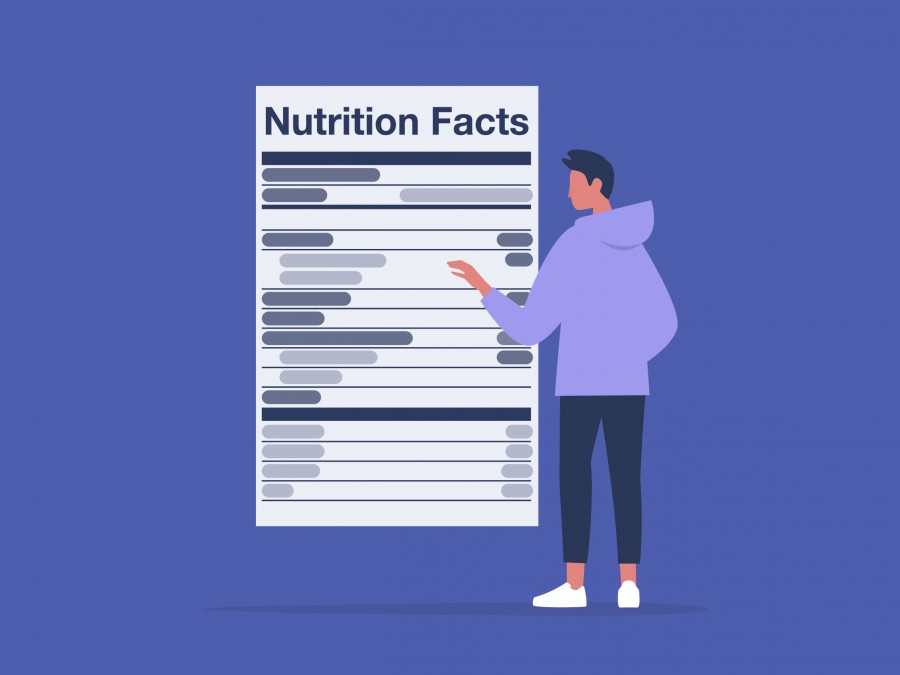
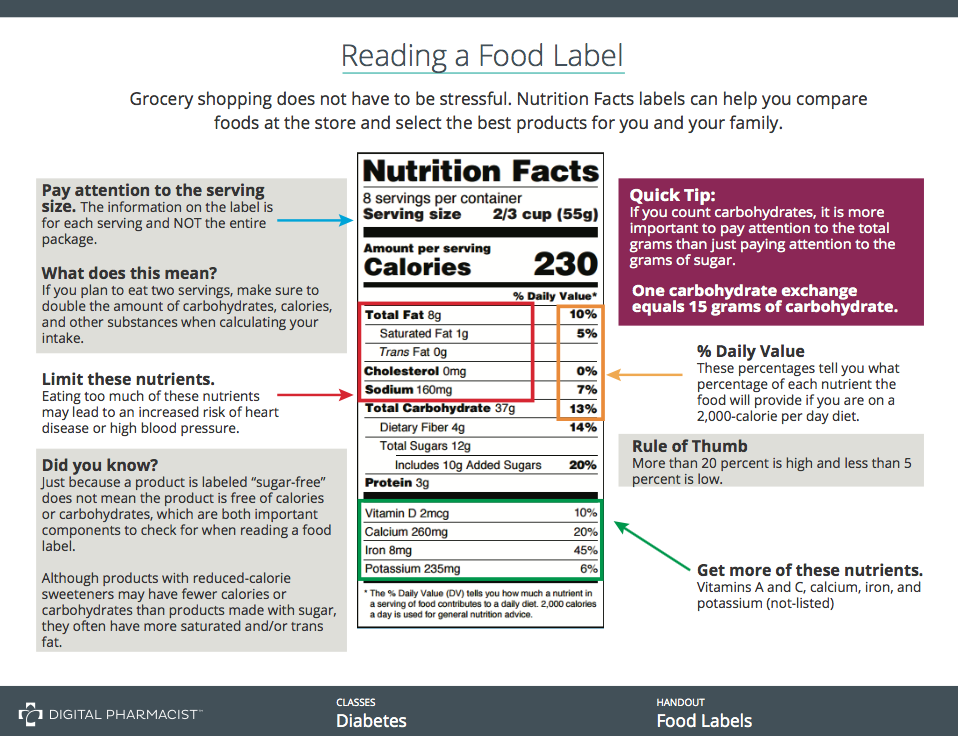
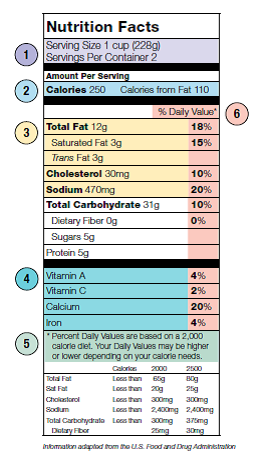
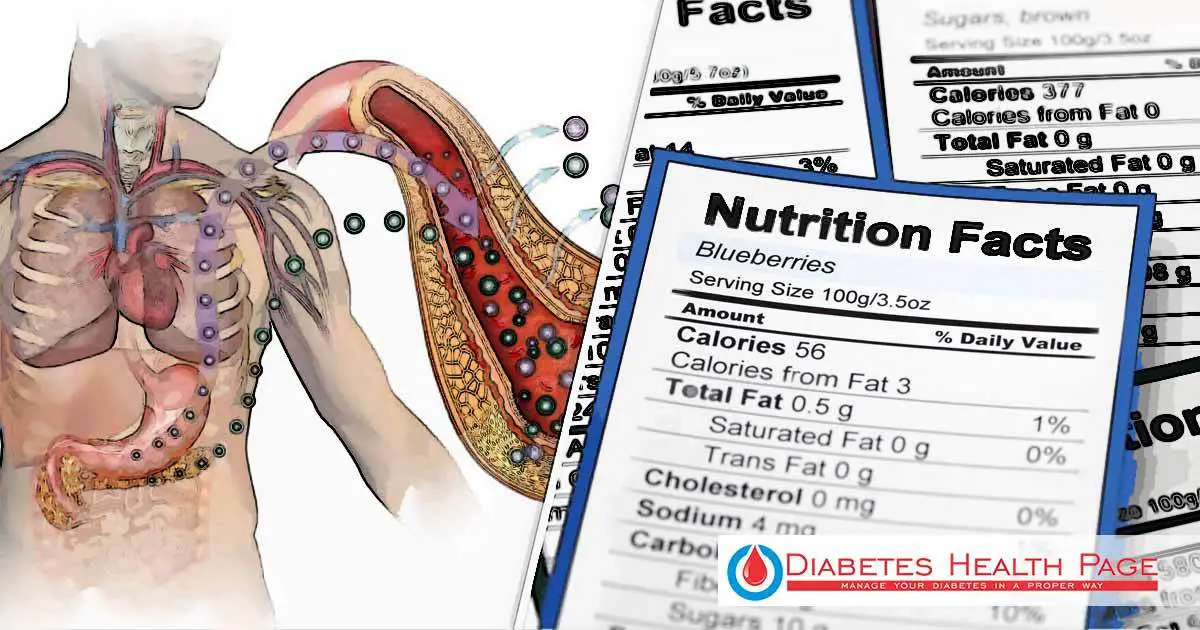
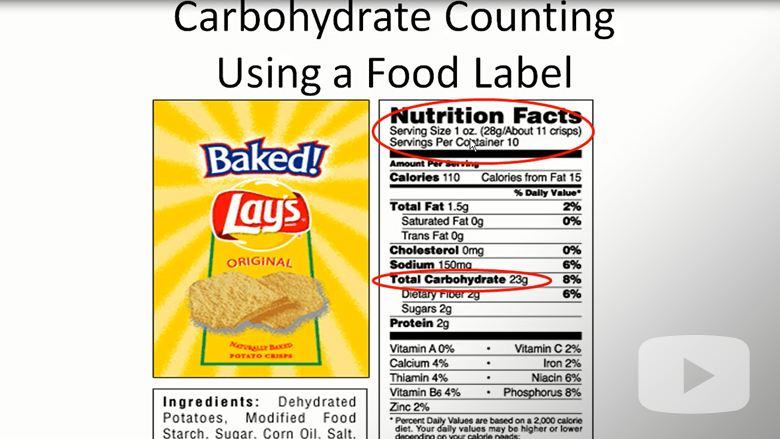
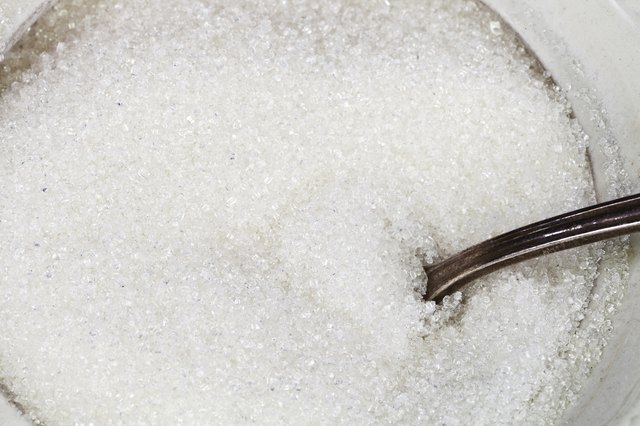





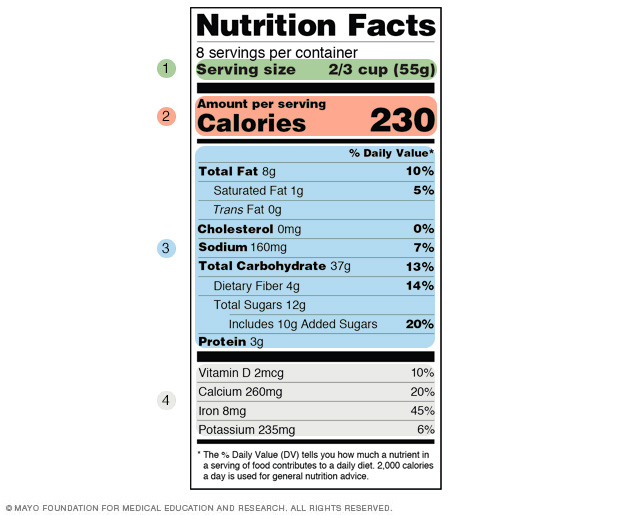
Post a Comment for "38 reading food labels diabetes"